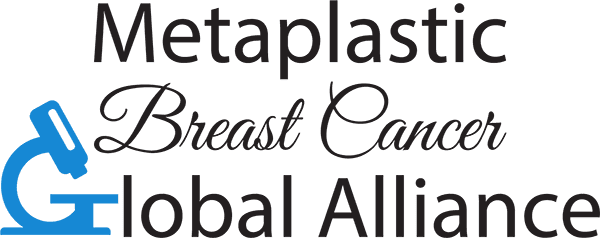Metaplastic Breast Cancer Global Alliance: Who Are We?

About Us : Metaplastic Breast Cancer Global Alliance
This grass-roots patient organization was started by a team of women, all diagnosed with metaplastic breast cancer, who are dedicated to helping to improve the outcome for all women in this community.
Upon facing the initial shock of a breast cancer diagnosis, we also found ourselves contending with a unique challenge: a form of breast cancer so rare that many of us did not even know it existed. Pre-diagnosis, most of us imagined breast cancer to be one entity, a single threat affecting mostly women (but some men as well), to be treated with the traditional approach of chemotherapy, radiation, and/or surgery. The reality is far more nuanced.
Most breast cancers – roughly 80% – are hormone sensitive, comprising the bulk of current research used to determine a reliable standard of care. Depending on factors such as stage, grade, and size, treatments may vary, but usually include lumpectomy or mastectomy, various chemotherapy protocols, and/or radiation. Another group of breast cancers, triple negative – roughly 10-20% of all cases – are harder to treat, but because of the relatively significant number of cases, these too have been amply studied and a decent amount of treatment protocols exist.
Then there are others – the “one-percenters” – and it is in this category that we find metaplastic breast cancer. Estimated at less than 1% of breast cancer diagnoses, MpBC is most often triple negative, but less treatable and less likely to have a positive outcome.
As you can probably imagine, the weight of a breast cancer diagnosis on its own can be staggering, let alone the moment your doctor makes the grim determination that you are part of a very rare sub-group. That, because of the rarity, there is really no protocol that exists, no established course of treatment for it. To say this experience turned our worlds upside-down would be an understatement. As with most cancer patients, many of us took to the Internet to do independent research, and through sheer good fortune – and a Facebook group dedicated to our unique type of cancer – we found each other. With over 600 of us from all around the world (albeit a very small portion of total cancer cases), we have come together to form a large and supportive community of patients hoping for more research, better funding, and an improvement in our individual outcomes.
Where are we today?
We now have significantly more information than we did when our journey began, but not nearly enough. What we do know is disturbing. Because of the relatively small incidence of our particular affliction, traditional breast cancer research tends not to focus on MpBC. In fact, most of what is currently known is likely due in part to our inclusion in studies of triple negative breast cancer, a distinctly different sub-type. After diagnosis, most of us are treated with existing protocols, as though we had a standard type of triple negative breast cancer. When we question why we didn’t receive a more targeted treatment, the best answer many of us have received is that, today, the medical community can only offer its existing knowledge, which falls perilously short of sufficient.
After enduring physically and emotionally taxing chemotherapy treatments and radiation, some of us do go on to enjoy long lives, with no remaining evidence of cancer cells. But an alarming number of cases recur immediately following treatment, and worse, individuals may find that the cancer has spread to a distant site, known as a metastasis, or Stage IV cancer. That is when the battle to save lives truly begins.
When a patient is at Stage IV, a lot of the rules governing the “standard of care” are suspended, and doctors are freer to try “last-ditch”, experimental treatments, to save lives. For women in this stage, other types of chemotherapies are attempted, and sometimes the result is overwhelmingly positive, able to both prolong and improve the quality of lives. This outcome fosters the hope that if these other protocols are tried when diagnosis is first made, they might be able to provide a cure and prevent recurrence. Great strides have been made at MD Anderson to help women at this stage, and our dearest wish is that we can continue the research that first led to these successes.
Take a look at our accomplishments SO FAR.
Where are we going?
As a community of women, we are in the process of consolidating our group, coordinating our activities, fundraising, educating, and working with a noted oncologist and researcher to get the attention that we need. Our goal is to re-invigorate research targeted at MpBC, to determine when standard chemo protocols are appropriate, and when other protocols should be applied. We envision a time in the not-so-distant future when women diagnosed with early stage MpBC can be told by their doctors that the protocol they are being treated with is known to produce good results for that specific type of cancer, and that the future is not so grim. We strive to bring hope to the horizon for women diagnosed with MpBC and their families.
